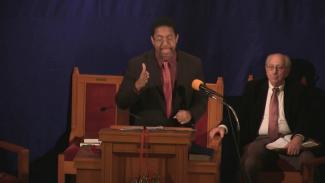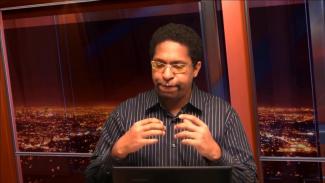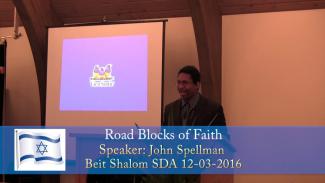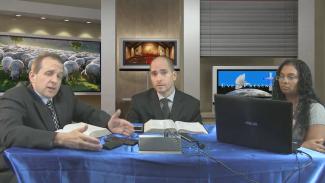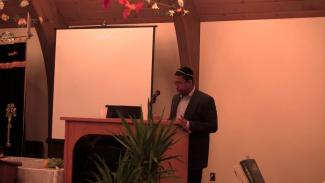What is true greatness? How did Jesus define what it means to be great? How did Jesus believe those who are great should treat people? How can we compare this with our society today and the way it treats people? What are the ways in which we still break the first and second commandments today? Do we still have images or other gods in our lives? What are the things we still idolize? The book of Matthew illustrates instances in which people, like the rich young ruler, put possessions before God. Many were not willing to surrender everything and entrust it to God.
2016 Broadcasts
Choose from all 2016 broadcasts or select a topic from the menu.John Spellman preaches on the true meaning of Christmas. Though Jesus wasn't born on December 25th, the Christian world commemorates His first advent. But why did Jesus come to this world as a baby? What was the purpose of His arrival? What hope is there in the first coming of Jesus for people today? What are we really celebrating in the Christmas season? Was Jesus really the Son of God? Why was He called Immanuel? These questions are explored as we discuss the true meaning of Christmas.
What kind of person was Job? How did he relate both to God and to the people around him? How was Job’s faith demonstrated in his works? Did Job sin in thought? Did Job’s wealth diminish the quality of his relationship with God? How did Job learn to be faithful to God? Was he born special or with some kind of advantage? Can people be blameless and upright in today’s world as Job was in his time? This week we study the character of Job.
Job knew his Redeemer lived! How can we share in this hope today? What were the parallels between the suffering of Job and the suffering of Christ? What critique did Job make against God? How was this question answered in the person of Jesus Christ? When we don’t have all the answers here and now, how can we place our faith in God? In what way was Christ’s suffering different from that of Job?
God answers Job after his long speech and asks a series of questions. What is the purpose to God’s questions? When we pray should we expect God to answer back? What did Job learn from God’s response? Can we ever truly accuse God of wrong doing when things in life are not as we might want them? Job learns that God is awesome and that there is so much he doesn’t know. How might this story be a lesson for us when we go through times of hardship and we think God is unfair?
John Spellman preaches at the Beit Shalom SDA Congregation discussing roadblocks in our faith. How can traditions and customs block us from being able to experience a relationship with God? Should traditions influence how we understand God's Word? What did the prophets think about anything that contradicted the Torah and the testimony? Is it possible that today, with the abundance of YouTube scholars, and misinformation, that many have darkness thinking they have light? While some traditions can be a good thing, many customs and traditions are holding people in darkness.
After Job’s friends attempt to comfort him, Elihu jumps into the conversation. Was Job guilty of justifying himself rather than God? How can God be righteous if good people suffer and God permits it? Does God have a purpose in human suffering? Was Job really just and upright? Why did God respond to Satan’s challenge? What does this mean for us today? How is God’s perspective different from the human perspective? Can suffering ever be a good thing?
In the post election season there is much unrest. As people disagree over politics and other matters, violence sometimes takes the place of communication. How can we still be Christians even in the midst of disagreement? As many protests erupt, some have chosen to go to extremes. Should Christians follow the crowd? Are people's actions justified by their cause? What if the cause is right? Can the message of unity be heard amidst divisiveness? Where is God when people are choosing sides and the future seems so bleak?
How do Job’s 3 friends Eliphaz, Bildad, and Zophar attempt to comfort him? What kind of advice to they give? What can we learn from their experience about comforting those who go through tragedy? Is sin always the reason for bad things that happen? Do we always know why people go through difficult experiences? Does God always punish sin? Are there Biblical examples of divine retribution? Is there a point at which people have gone too far?
What does the Bible say about depression? Does God care about how we feel? When we encounter situations in life that leave us in despair, how can God be the answer? How does the story of Job illustrate the way in which God can be an Ever-Present help in our times of need and suffering? Whether it be job loss, the loss of a partner, a failure or setback, a death of someone close, or something that makes you feel hopeless and lost, God is an ever-present help!
As Jewish people celebrate the feast of Sukkot, Christians should be reminded of what it meant and what it pointed to in prophecy? What if I told you it had a hidden meaning that was significant for our time today? Was the feast of Tabernacles only a commemoration of freedom from Egyptian bondage? Or was there something it pointed to in the prophetic future and the ministry of Jesus? Why did God want the people to dwell in booths? We will take a brief look at salvation history as good and evil struggle for custody of humanity in the Great Controversy.
Why does God allow human suffering? Does human suffering really disprove the existence of an almighty and all powerful God? What does the Bible have to say about human suffering? Why does God permit it? Did Job still believe in God even when he went through times of hardship? How do the cosmological argument, theodicy, and the great controversy help us to understand the question of human suffering and the existence of an all-powerful God?


